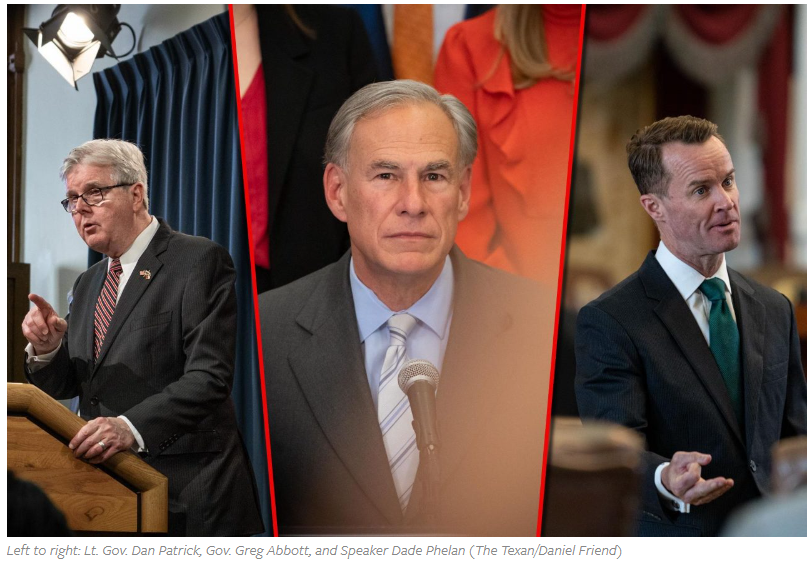News: Property Taxes Primed for a Special Session After Appraisal Reform Dispute Stalls Out5/29/2023 State leaders promised “historic” property tax relief this session, but though it is near the finish line, it will not make it past the checkered tape before the body adjourns sine die on Monday.
Last summer, Gov. Greg Abbott called on the Legislature to appropriate “at least half” of the then-$27 billion projected budget surplus to provide “the largest property tax cut ever in the history of Texas.” The comptroller’s January Biennial Revenue Estimate increased that total to $32.7 billion in the state treasury and $27 billion in the Economic Stabilization Fund, also known as the state’s savings account. That’s a lot of tax dollars to disburse, and number one on Abbott’s list was property taxes — which was also high on the list of both chambers. But after a lengthy, attention-grabbing impeachment proceeding against Attorney General Ken Paxton on Saturday afternoon, the clock ticked on toward the midnight deadline to distribute the conference committee report for the last-remaining property tax proposal. And then, some Sunday evening scrambling on a last-minute deal turned out to be more smoke than fire — the House conferees announced the signing of a deal last night, and posted a picture of them waiting for the Senate’s conferees to come sign it, but that ultimately did not happen. Details of that blueprint have not been disclosed as both sides have kept their cards close to their chest. The Texan can confirm that plan included the $12 billion for rate compression, a $70,000 standard homestead exemption, a $100,000 elderly and disabled homestead exemption, and a 7.5 percent appraisal cap on all real property. After a hastily convened meeting with Lt. Gov. Dan Patrick and Abbott, Speaker Dade Phelan (R-Beaumont) made a beeline for the House dais and adjourned the body until Monday morning with no deal announced on marquee property tax relief. Discussions continued into Monday morning but no deal was struck — appraisal caps being the point of insurmountable disagreement. Abbott tacitly weighed into the debate, gesturing at putting rate compression above all else, but it did little to move the needle one way or the other. The Texas House passed a revamped version of Senate Bill (SB) 3 on May 19 — a plan that included $12 billion for new rate compression and the 5 percent appraisal cap on all property from its original plan. But it also included a $100,000 homestead exemption, double what the Senate included in its proposal. Ultimately, the two sides could not coalesce on a compromise; the House dug its heels in for an appraisal cap reduction and extension, while the Senate dug its heels in against it. The ramped-up homestead exemption was not enough to entice the upper chamber to swallow the appraisal cap pill. Lt. Gov. Dan Patrick has maintained it to be a total non-starter in the upper chamber. As passed by the House, SB 3 would have amounted to $16.3 billion in property tax curtailment, plus the $5.3 billion already in the budget to maintain previous levels of compression. Because of this stalemate, and the emphasis Abbott has placed on it, property tax relief is sure to be on the list of issues for the coming special session — expected, but not yet confirmed, to start Tuesday. Property tax relief was on the governor’s list of emergency items at the beginning of the session. Even with the appraisal reform stalemate, there is a starting point of common ground between the chambers. The 2024-2025 state budget, approved by both chambers over the weekend, earmarks $17.3 billion for rate compression — $5.3 billion to maintain previous levels and $12 billion to add to it. The budget has no line item for homestead exemption increases and the appraisal cap extension would not require any financial injection. When the two bodies reconvene, it’s unclear how this stalemate could be resolved other than both just throwing up their hands and moving forward only with the rate compression — the aspect they both agree on. The previous record for the largest property tax cut is $14 billion in the mid-2000s. Both chambers of the Legislature have said their plans surpass that line — including the $5.3 billion to maintain current levels. Critics of that claim — such as Vance Ginn, former chief economist for the Texas Public Policy Foundation — have set the line at $20 billion in today’s dollars accounting for inflation, and also say that the entire sum of dollars going toward property tax relief should be allocated to compression. On top of this, add in the fact that to maintain levels of compression next biennium, the state will have to allocate the same amount of money toward it. Otherwise, tax bills will jump. Before the House adjourned sine die, Lt. Gov. Dan Patrick issued a letter asking for Abbott to include the Senate’s property tax plan — a $70,000 standard homestead exemption, $30,000 elderly and disabled homestead exemption, a $25,000 business personal property tax exemption, and a business inventory tax credit — among a litany of other priorities. Despite the appraisal stalemate running out the clock on this session, the Legislature will quickly have another go at the issue and the chance to fulfill the promises made before and during the 88th regular session. Originally published by The Texan.
0 Comments
Leave a Reply. |
Vance Ginn, Ph.D.
|


 RSS Feed
RSS Feed